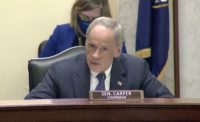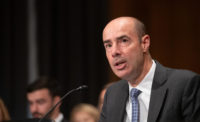The Senate has approved Michael Whitaker, President Joe Biden’s nominee to head the Federal Aviation Administration, securing the high-profile agency its first confirmed leader since April 2022.
Whitaker, whose extensive aviation resume includes stints as FAA’s deputy administrator and several years as a United Airlines senior vice president, was confirmed on Oct. 24 by a unanimous vote of 98-0.
The margin was no surprise–just six days earlier the Senate Commerce, Science and Transportation Committee cleared Whitaker’s nomination, also unanimously.
U.S. Dept. of Transportation Secretary Pete Buttigieg said in a statement after Whitaker was confirmed that “Mike has earned broad bipartisan support because it’s clear he has the expertise and disposition to successfully lead the agency from day one.”
Buttigieg added, “As with all infrastructure, inadequate investments in modernization–from buildings to software–can leave the entire system more vulnerable to failures, so we must work closely with Congress to ensure the FAA remains the gold standard of safety and efficiency.”
Whitaker will oversee a multi-billion-dollar annual infrastructure budget at the agency. The centerpiece is its longstanding Airport Improvement Program (AIP), which provides about $3 billion per year in grants for improvements to runways and other airfield infrastructure.
FAA’s infrastructure responsibilities were expanded greatly by the 2021 Infrastructure Investment and Jobs Act, which provided an additional $25 billion over five years for terminals, control towers and other projects.
Kevin M. Burke, Airports Council International–North America, said in a statement, “The aviation industry continues to navigate challenges presented by mounting infrastructure needs and important policy priorities, like FAA reauthorization.”
Burke said his group “is confident that Michael Whitaker is up to the challenge.”
In March, Biden’s previous choice to head the FAA, Denver International Airport CEO Phillip Washington, withdrew as a candidate for the top FAA post after facing opposition from Senate Republicans. They contended Washington lacked the right background for the position.
As Whitaker prepares to take on his new job, as Burke alluded, a critically important issue will be whether Congress will approve a new, multi-year FAA reauthorization bill.
The previous statute was due to expire on Sept. 30. But in passing a wide-ranging stopgap spending bill extending through Nov. 17, Congress also extended FAA programs, giving them a bit more breathing room with a deadline of Dec. 31.
On July 20, the House approved a five-year FAA measure by a 351-69 margin. It authorizes $4 billion a year for AIP, a 19% increase over current levels.
The legislation has stalled in the Senate. In that chamber, commerce committee Chair Maria Cantwell (D-Wash.) and the committee’s top GOP member, Ted Cruz (Texas), in June introduced their version of an FAA measure. Like the House’s version the Cantwell-Cruz proposal spans five years and would provide $4 billion annually for AIP.





Post a comment to this article
Report Abusive Comment